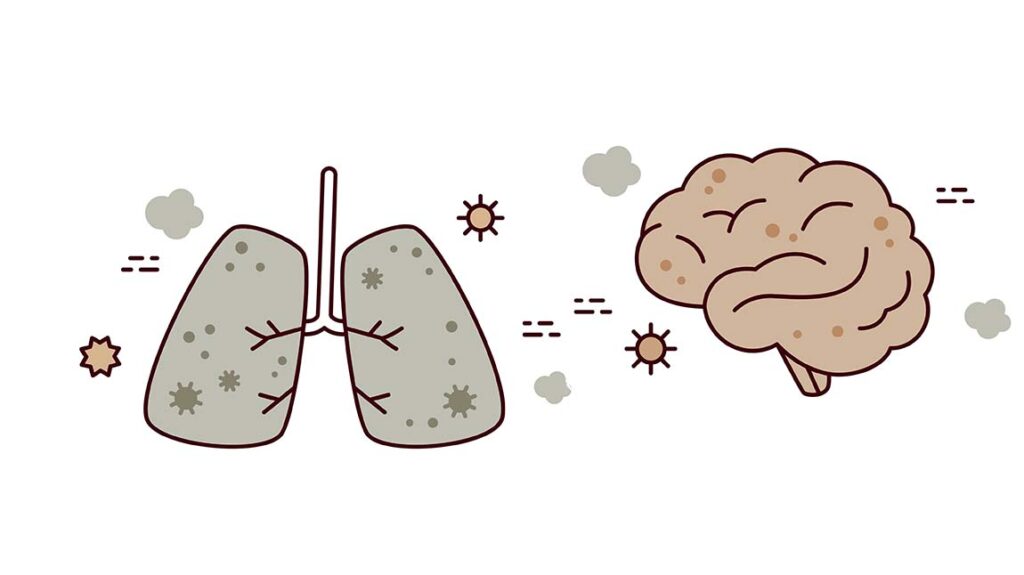Did you know that the air quality you breathe daily influences more than just your lungs? It also affects your memory, concentration, and even your mood. Indeed, air is not merely a mix of oxygen and nitrogen but a genuine cocktail that can contain fine particles, allergens, and other pollutants. Depending on its composition, this cocktail can either boost or hinder your respiratory and cognitive vitality. Let’s delve into this fascinating subject that connects our lungs to our brain to better understand the impact of air on our lives.
The Air We Breathe: Elixir or Poison
The Lungs: The First Line of Defense
Imagine your lungs as two extraordinary sponges, capable of absorbing nearly 8,000 liters of air each day. But what happens when this air is filled with pollutants? Fine particles (PM2.5 and PM10), nitrogen oxides, and ozone directly assault lung tissue. These substances irritate the respiratory tract, promoting diseases such as asthma, chronic bronchitis, and, in the long term, cancers. Even in healthy individuals, prolonged exposure to poor air quality can lead to a decrease in lung capacity.
The Brain: A Silent Victim
We often talk about the lungs, but did you know that the brain is also affected? Inhaled nanoparticles can cross the blood-brain barrier, the fortress meant to protect our brain. Once in the nervous system, they disrupt communication between neurons, leading to cognitive disorders: memory decline, difficulty concentrating, and, in extreme cases, an increased risk of dementia. A true red alert for our brain functions!
Indoor Air Quality: An Unseen Trap
Domestic Pollution: The Hidden Enemy
We tend to think that the inside of our homes is a refuge against pollution. Unfortunately, it’s often quite the opposite. Cleaning products, scented candles, paint, and even furniture release volatile organic compounds (VOCs) that pollute indoor air. These substances can cause respiratory irritations, headaches, and, in the long term, neurotoxic disorders.
Simple Actions to Purify Your Space
Fortunately, it’s possible to improve the air quality at home. Ventilate daily, opt for natural cleaning products, and invest in air-purifying plants like ivy or ferns. And if you have an air purifier, even better! These small actions can transform your home into a haven of well-being.
Cognitive Impacts: Think About Your Brain’s Future!
Pollution and Oxidative Stress
Oxidative stress, caused by an overload of pollutants, is one of the most insidious mechanisms affecting the brain. This process damages nerve cells and disrupts neurotransmitter regulation mechanisms. The result? Increased mental fatigue, constant irritability, and a decline in intellectual performance.
Pollution and Neurodegenerative Diseases
Recent studies show an alarming link between air pollution and diseases like Alzheimer’s or Parkinson’s. Fine particles can promote brain inflammation, a key factor in the development of these pathologies. Thus, breathing clean air also means protecting your brain in the long term.
Solutions Within Reach
Collective Initiatives
Many cities worldwide are taking measures to improve air quality: reducing high-emission zones, developing electric public transportation, and greening urban spaces. These initiatives make a notable difference but require everyone’s support to be effective.
Adopt Eco-Responsible Habits
You can also act on your own scale. Favor walking, cycling, or public transportation. When driving, adopt eco-driving habits to limit emissions. Finally, support local policies aimed at improving the air we breathe.
The Emotional Connection: A Breath of Positive Energy
Breathe Well, Live Well
Clean air not only protects our lungs and brain but also improves our mood and quality of life. Take a moment to breathe deeply in nature: it’s a true therapy, releasing endorphins and reducing stress.
The Future Is in Our Hands
By improving air quality, we can not only prevent many diseases but also offer future generations a healthy and livable environment. It starts with simple yet powerful choices: consuming better, moving better, and breathing better.
Conclusion: Breathe Life to the Fullest!
Air is our primary source of energy. Each breath can either nourish or deteriorate our respiratory and cognitive health. So, take care of this invisible treasure, whether by acting on your immediate environment or supporting large-scale initiatives. Because by protecting the air, you also protect your mind and joy of living. Breathe deeply, smile… and commit to a future where clean air is the norm!
Sources :
- WHO – Air pollution and cognitive health
- Nature – Airborne particulate matter and neuroinflammation
- The Lancet – Respiratory diseases linked to air pollution
- Environmental Health Perspectives – Indoor air quality and VOCs
- PNAS – Particulate matter and brain aging


